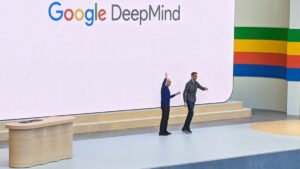How a Passion for Chess Inspired the CEO of Google’s DeepMind to Pursue a Career in AI and Achieve a Nobel Prize

How Chess Inspired a Career in AI: The Story of DeepMind’s CEO
The Intersection of Chess and Artificial Intelligence
Chess, a game renowned for its complexity and strategic depth, has significantly influenced various realms, particularly in artificial intelligence (AI). For many, including the leading minds behind AI advancements, chess serves as a foundational element that shapes understanding and innovation in technology.
The Impact of Chess on Cognitive Development
Playing chess doesn’t just entertain; it fosters cognitive skills that are crucial for problem-solving and strategic thinking. Experts often highlight several benefits of engaging with chess:
Enhanced Problem-Solving Skills: Chess challenges players to think several moves ahead, fostering a mindset adept at logical reasoning and strategic planning.
Improved Memory: Memorizing moves and strategies develops a player’s memory capacity, a skill beneficial in both academic and professional settings.
Increased Concentration: The game’s competitive nature demands sustained focus, translating to improved attention in other areas of life.
- Critical Thinking: Each game poses unique challenges, pushing players to analyze situations critically and adapt their strategies accordingly.
The Journey of DeepMind’s CEO
One prominent figure whose love for chess has significantly shaped his career is Demis Hassabis, the CEO of Google DeepMind. From an early age, Hassabis demonstrated exceptional talent in chess, competing as a child prodigy. This passion not only honed his intellectual abilities but also propelled him into the field of AI.
Early Beginnings
Demis Hassabis was exposed to chess at a young age. His experiences in competitive play fostered a deeper understanding of the game’s complexities, which became a springboard into AI research. Influenced by his love for both chess and cognitive neuroscience, Hassabis sought to create machines that could replicate human-like intelligence.
Founding DeepMind
In 2010, Hassabis co-founded DeepMind Technologies, a company dedicated to advancing AI through innovative algorithms. The company began by focusing on neural networks and reinforcement learning, methods crucial for developing intelligent systems capable of learning from experience, much like a chess player does.
Achievements and Contributions
DeepMind’s advancements have garnered worldwide recognition, including a historic achievement in 2016 when their AI program, AlphaGo, defeated a world champion Go player. This feat highlighted the potential of AI not just in games but across various fields such as healthcare, where DeepMind applies its technology to improve patient outcomes.
Recognition and Awards
Hassabis’s contributions have not gone unnoticed. His pivotal role in AI development, particularly through DeepMind’s innovative projects, has led to prestigious accolades, including a nomination for the Nobel Prize in Economic Sciences. These accomplishments underscore the intersection of artificial intelligence, cognitive science, and the strategies that chess taught him.
Chess and AI Development
Chess continues to be a valuable tool in the development of AI. By analyzing vast numbers of historical games, AI systems can learn from past strategies, enabling them to develop new approaches and outsmart human opponents. This dynamic relationship between chess and AI extends beyond mere play; it symbolizes the potential for AI to evolve through complex problem-solving paradigms inspired by strategic games.
The Future of AI Inspired by Chess
As AI continues to advance, the principles drawn from chess will remain relevant. The strategies developed from this ancient game can inspire future AI systems to tackle real-world issues, driving innovation in technology, healthcare, and beyond.
In summary, the love for chess can lead to remarkable paths in AI, as exemplified by the journey of Demis Hassabis. His story highlights how the skills cultivated through chess can significantly influence advancements in artificial intelligence, shaping a future where machines can think and learn in ways once thought possible only for humans.






